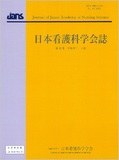Japanese
English
- 販売していません
- Abstract 文献概要
- 参考文献 Reference
要旨
目的:循環器看護スペシャリスト(SP)による外来通院中の心筋梗塞患者へのセルフケア教育の実践の実態と関連要因を検討する.
方法:慢性心不全看護認定看護師と慢性疾患看護専門看護師を対象とした無記名自記式質問紙を用いた横断的観察研究を行った.セルフケア教育の実践の有無と実践の程度に関連する要因を検討した.
結果:149名のうち95%以上がセルフケア教育は重要だと回答したが,約半数は教育を実践していなかった.教育の実践の有無と関連する要因は,外来心リハの設置,外来関連の部門へのSPの所属であった.教育の実践の程度は,セルフケア教育の重要性の認識が高いこと,医師・栄養士との協力体制と有意に関連していた.
結論:SPのセルフケア教育の実践率は約半数であった.実践率上昇には環境要因が重要である可能性が示唆された.実践の程度を上げるには,医師・栄養士との協力体制が効果的である可能性が考えられた.
Purpose: This study aimed to assess the quality of self-care education provided by cardiovascular nursing specialists (SPs) to outpatients with myocardial infarction (MI), and elucidated the factors associated with its implementation.
Methods: A cross-sectional observational study was conducted using a questionnaire consisting of questions probing the SP's practice of self-care education. Factors associated with the implementation of self-care education were assessed.
Results: Responses from 149 SPs were analyzed. More than 95% of SPs answered that self-care is important. Approximately half of the SPs reported that they did not offer self-care education to their patients. Factors associated with the implementation of self-care education included the presence of an outpatient cardiac rehabilitation center and working in the outpatient department. The extent of self-care education practice was positively correlated with the total recognition score, cooperation with doctors, and cooperation with dietitians.
Conclusion: Approximately half of the SPs did not offer self-care education to patients with MI. Installation of cardiac rehabilitation centers in hospitals, and assigning cardiovascular SPs to outpatient departments, are essential to ensure that self-care education is offered. Moreover, cooperation with doctors and dietitians influences the extent of self-care education practice.
Copyright © 2023, Japan Academy of Nursing Science. All rights reserved.


